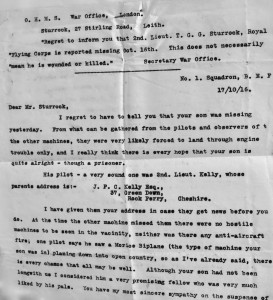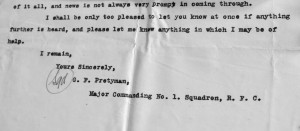Monthly Archives: November 2016
21st November 1916 Tuesday
All material produced or reproduced here and throughout this work is the sole copyright of the author and the family of Doctor D.C.M. Page MC.
Today in what seems like an act of either folly or extreme bravery, Lt Douglas Page presented himself once more to the War Office and signed on again for another tour of duty. He was not alone in this act of loyalty, many young men having survived the term of their contract, volunteered yet again to serve their country. This time though there was a distinct difference from November 1915. Douglas was under no illusion of what war would be like. He had already been through a year of horror. Clearly it wasn’t all terrible. Even in the midst of adversity there were some fun times. The pretty girls, Madame Zeppelin, Christmas dinner and Hogmanay in the trenches. He felt slightly torn leaving his comrades behind and obviously felt he had more to offer, saving lives on the battlefields.
“Next day – November 21st – I reported at the War Office, and signed on for another year’s service in Egypt this time, just for variety, I was granted leave until December 5th.
After visiting old billet friends at Epsom, I left King’s Cross for Auld Reekie at 11.30pm in a very crowded train which was 1½ hours late in getting into Edinburgh.”
Find out about our connection with Dr Page and an introduction to his diary here
20th November 1916 Monday
All material produced or reproduced here and throughout this work is the sole copyright of the author and the family of Doctor D.C.M. Page MC.
“… the boat was crowded, and the crossing was a bad one. I wasn’t at all well! Folkestone was reached about 9 o’clock and I got a seat in the Pullman for London. Victoria was reached at about 11am. Great! I drove across London in style in an old growler!* There were no taxis. I put up at Morley’s Hotel** in Trafalgar Square. After lunch saw the official war films at La Scala Picture Theatre.# At night I went to “the Bing Boys”## at the Alhambra. George Robey was in great form.”
The Channel crossing was a perilous affair at this time. On the 26th October 1916 only three weeks before Douglas’s voyage the regular Boulogne /Folkestone steamer “Queen” had been sunk by a German destroyer.
* A Growler was a four wheeled horse drawn taxi, so called due to the noise made by the wheels on the cobbled streets.
** Morley’s Hotel, favoured by Douglas on more than one occasion, stood on the spot now occupied by South Africa House,
# La Scala Picture Theatre was a largely unsuccessful theatre situated on the corner of Tottenham Street and Charlotte Street in Fitzrovia. It was used to show the very earliest of colour films in a process known as Kinemacolour. It was also used for the theatre scenes in the Beatles’ film “A Hard Day’s Night”. The site is now occupied by various buildings amongst which is Scala Court.
## “The Bing Boys are here” was a very popular revue that ran from 19th April 1916 at the Alhambra Theatre in Leicester Square until 1917. It was also produced on Broadway and was still in production in the 1930s. Probably the best remembered song from the show is “If You Were the Only Girl in the World” Douglas’s granddaughter Elizabeth remembers him often singing that tune. The Alhambra itself was originally built with minarets which by this time had been removed. After undergoing various rebuilds since it first opened as a theatre in 1856 it finally closed its doors in 1936 and was demolished soon after. The space today is occupied by a very drab building, Alhambra House.
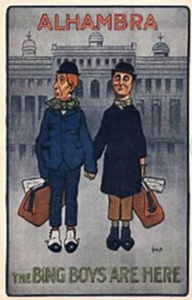 Find out about our connection with Dr Page and an introduction to his diary here
Find out about our connection with Dr Page and an introduction to his diary here
19th November 1916 Sunday
All material produced or reproduced here and throughout this work is the sole copyright of the author and the family of Doctor D.C.M. Page MC.
A significant day in young Douglas Page’s life and war. His contract had come to an end. It was almost a year since he departed on the train from Edinburgh on December 2nd 1915 and made the rough crossing to Le Havre aboard the Huanchaco and eventually to the Western Front. Having already survived numerous close calls with shells exploding just behind him at Richebourg church, the devastation of his Division the 38th Welsh at the Somme, the recent dud “archie” falling beside him, plus various “wind-up” occasions when he could so easily have been blown to pieces. All of these would have been enough to make the toughest of men feel that a chance to escape the horrors of the front would be welcome relief. He had done his stint and served his King, country and comrades well and he could have easily felt justified in being one of the lucky ones able to return home to tell his amazing tale.
“On November 19th I left Proven for ‘Blighty’ on the expiry of my year’s service. I was sorry to leave but wanted to get home to see how everything was going with Mother and the others. I got a train at Poperinghe at 2pm. I got to Boulogne about 7 o’clock, going via Hazebroucke, St Omer and Calais. I stayed at the ‘Hotel Metropole’ overnight and left France at 7am next day….”
Today there is still a hotel in Boulogne bearing the name Hotel Metropole but the original didn’t survive, Boulogne being heavily bombed in both World Wars.
Find out about our connection with Dr Page and an introduction to his diary here
14th November 1916 Tuesday
All material produced or reproduced here and throughout this work is the sole copyright of the author and the family of Doctor D.C.M. Page MC.
“On the 14th we were made happy by the news of a great British victory on the Somme – the capture of Beaumont Hamel with 4000 prisoners and 60 guns.”
Some good news at last of progress on the Somme. Beaumont Hamel had been the subject of a failed attack on the opening day of the Battle of the Somme way back on the 1st of July. It had become regarded as an almost impregnable German stronghold, so news of a welcome victory was heart-warming to Douglas and his compatriots.
Beaumont Hamel fell to the Allies in what is now known as the Battle of Ancre on the previous day 13th November. Originally scheduled for the 24th October, there were numerous postponements due to terribly wet conditions. Finally, the go-ahead was given for Monday 13th and four divisions of the 5th Army with another division in reserve successfully took the village of Beaumont Hamel and the heavily defended “Y” shaped ravine leading down to the British lines.
Beaumont Hamel is also close to the location of the Hawthorn Crater caused by the massive explosion that at 07.20 on July 1st signalled the start of the Battle of the Somme.
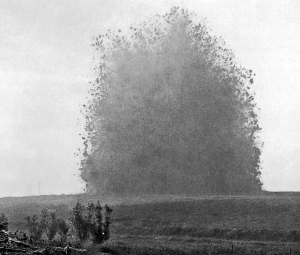
The famous picture of the mine exploded on Hawthorn Ridge. A still from the movie by Geoffrey Malins.
Further information on the battle can be seen here.
More useful information of the area can be found here.
Find out about our connection with Dr Page and an introduction to his diary here
8th to 11th November 1916
All material produced or reproduced here and throughout this work is the sole copyright of the author and the family of Doctor D.C.M. Page MC.
“On November 8th, I motored up to Trois Tours Chateau to take medical charge of the 14th Royal Welsh Fusiliers, whose own doctor was on leave. Next day the battalion went into the trenches – my luck as usual! We took on from the 13th Royal Welsh Fusiliers, and I met Col. Campbell, Major Lloyd and all the old gang up there during the handing over. On going round the trenches next day I found them very muddy, and full of water in parts. There was no artillery activity, but lots of aeroplanes were up, it being a lovely clear sunny day. I got a fright when a ‘dud’ anti-aircraft (archie) shell fell quite close to me. I had to rush up to Lancashire Farm in the afternoon to a man who was badly hit, and burned by a shell which burst in the dug-out! He wasn’t killed either! We had a great trench-mortar stunt at night. Fifteen-hundred rounds were fired and the artillery butted in too. The din was terrific.
I was relieved on the 11th, and got back to Proven that night.”
Find out about our connection with Dr Page and an introduction to his diary here
7th November 1916 Tuesday
All material produced or reproduced here and throughout this work is the sole copyright of the author and the family of Doctor D.C.M. Page MC.
“On Tuesday November 7th 1916, I went via ambulance car to the Corps Rest Station at Mont des Cats with some patients. It rained heavily all day, and thus spoiled what would have been a pleasant trip through interesting country. The Corps Rest Station was situated in the ancient monastery on the top of the Mont des Cats. After leaving our patients there I took the car on to Bailleul where I visited the Headquarters of No 1 Squadron RFC. Here I had hoped to get some news of Gordon Sturrock (my future wife’s brother) who had been missing for some days. But at that time I got no further information. Later on we heard that the aeroplane in which he was acting as observer had been shot down by the enemy, and that Gordon had been very grievously wounded. He died later and was buried at Lincelles in Belgium.”
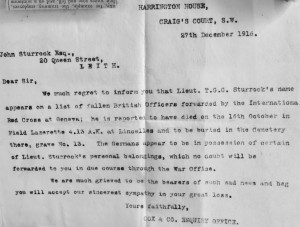 Find out about our connection with Dr Page and an introduction to his diary here
Find out about our connection with Dr Page and an introduction to his diary here3rd & 4th November 1916
All material produced or reproduced here and throughout this work is the sole copyright of the author and the family of Doctor D.C.M. Page MC.
“A concert given by the 4th Motor Ambulance Corps pierrot troup – the “Merry Macs” – on November 3rd, was very good.
Next day I nearly gassed myself. A gas bomb exploded prematurely, and I got a nasty burn on one arm, and felt seedy all day.”
Find out about our connection with Dr Page and an introduction to his diary here
